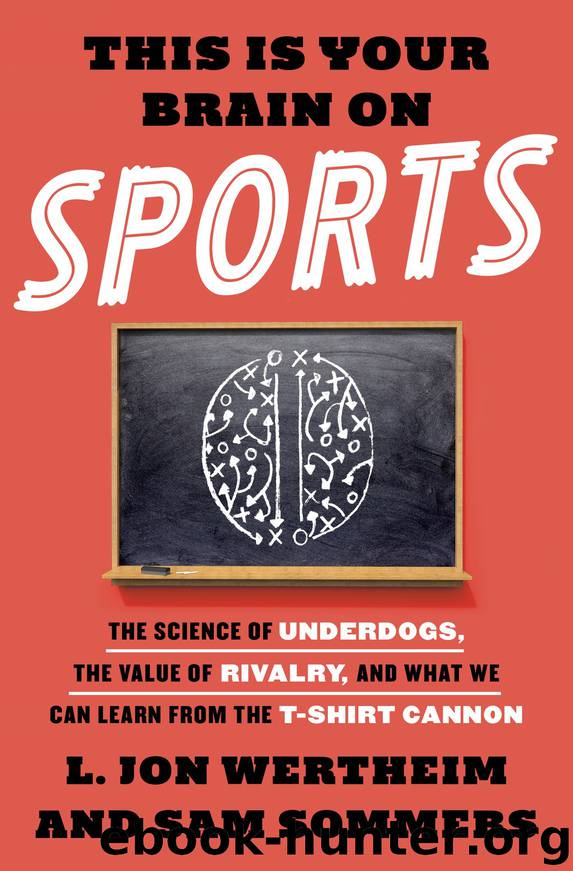This Is Your Brain on Sports by L. Jon Wertheim

Author:L. Jon Wertheim
Language: eng
Format: epub
Publisher: Crown/Archetype
Published: 2016-02-01T16:00:00+00:00
* * *
* Consider smokers who turn to vaping—using e-cigarettes, which simulate much of the sensation of smoking—in an effort to quit their habit. They’re essentially hoping that they’re as addicted to the physical acts of holding a cigarette, inhaling, and exhaling as they are to the nicotine in tobacco.
Why Giving Every Little League Kid a Trophy Is Such a Lousy Idea
They sit atop faux marble bases. And they sit on shelves, bookcases, and mantels. But lately sports trophies have also come to sit in boxes, bins, and storage lockers. They have lost so much value, they’re the Weimar currency of our age. Why? Because supply keeps pace with demand. Everyone who’s spent time in the youth-sports ecosystem knows that trophies are ubiquitous. Everyone gets one—regardless of effort or outcome.
There is no question that this movement has been a boon to trophy manufacturers. By some reports, the American Youth Soccer Organization spends more than 10 percent of its annual operating budget on figurines and plaques. Trophy sales amount to a more-than-$3 billion industry in North America alone.
Yet whether this has been a boon to our kids…well, that’s a knottier matter. In a recent poll, 57 percent of Americans agreed that only kids on winning teams should get trophies. James Harrison, NFL linebacker, recently made national news by vowing to return his sons’ participation trophies. In an Instagram post punctuated by #harrisonfamilyvalues, the Steeler Pro Bowler announced that his boys would have to wait to “earn a real trophy.”
As illustrated by Rush Limbaugh’s vocal endorsement of Harrison’s post, political conservatives are particularly likely to bemoan the participation trophy as the tin-plated totem of a weakening American work ethic. Too much praise and too many trophies make us soft and entitled, the thinking goes. Time to give the proverbial stiff-arm to the trophy epidemic. Or as Glenn Beck said: “Please stop teaching my children that everyone gets a trophy just for participating….There are losers in life.”
But one can also object to the ubiquitous participation award without adopting a Darwinian (Beckian?) focus on classifying “winners” and “losers.” We’d propose that the biggest risk posed by trophy culture isn’t that too much praise makes kids soft. Rather, it’s that we’re not praising our kids correctly.
To illustrate this, allow us to take you on a field trip to South Bend, Indiana, at the dawn of the 1980s. We’ll look in on a college hockey program struggling on the precipice of extinction and on a research-based effort to turn the team around. This was no Full Metal Jacket–like attempt to make the players winners by first breaking them down, harping on their limitations, and showing them why they were losers. On the contrary, this is a comeback story in which praise—the right kind of praise—plays a starring role.
—
FOR as often as we mention the storied tradition of Notre Dame athletics, little of the mythology centers around games played on ice. Yet in recent years, the Irish hockey team has emerged as one of the school’s most successful programs and an unlikely national college powerhouse.
Download
This site does not store any files on its server. We only index and link to content provided by other sites. Please contact the content providers to delete copyright contents if any and email us, we'll remove relevant links or contents immediately.
The Inner Game of Tennis by W. Timothy Gallwey(3682)
Unstoppable by Maria Sharapova(3523)
Crazy Is My Superpower by A.J. Mendez Brooks(3398)
Urban Outlaw by Magnus Walker(3393)
Mind Fuck by Manna Francis(3182)
The Social Psychology of Inequality by Unknown(3023)
The Fight by Norman Mailer(2931)
Unstoppable: My Life So Far by Maria Sharapova(2501)
Accepted by Pat Patterson(2366)
Going Long by Editors of Runner's World(2360)
Futebol by Alex Bellos(2357)
Backpacker the Complete Guide to Backpacking by Backpacker Magazine(2244)
Sea Survival Handbook by Keith Colwell(2241)
The Happy Runner by David Roche(2234)
Motorcycle Man by Kristen Ashley(2232)
The Sports Gene: Inside the Science of Extraordinary Athletic Performance by David Epstein(2175)
Peak: Secrets from the New Science of Expertise by Anders Ericsson & Robert Pool(2033)
Endure by Alex Hutchinson(2023)
The Call of Everest by Conrad Anker(1908)
